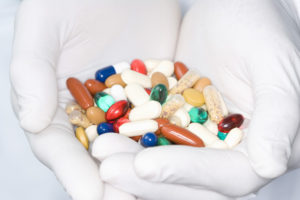Sen. Chuck Schumer Wants to Keep Your Child From Overdosing on Medicine
Sen. Charles E. Schumer is calling on federal regulators to require that all liquid children’s medications be equipped with safety devices called flow restrictors, following an investigation by ProPublica and testing by Consumer Reports showing that the devices can help prevent accidental overdoses.
By Theodoric Meyer and T. Christian Miller, ProPublica
This piece first appeared on ProPublica.
Sen. Charles E. Schumer is calling on federal regulators to require that all liquid children’s medications be equipped with safety devices called flow restrictors, following an investigation by ProPublica and testing by Consumer Reports showing that the devices can help prevent accidental overdoses.
Flow restrictors are small plastic valves that fit into the necks of bottles of liquid medicine, slowing the release of medication and making it harder for children to swallow a harmful amount. Each year, about 10,000 children visit the emergency room for potential medication overdoses, according to data from the Centers for Disease Control and Prevention. Many suffer no lasting harm, but some are hospitalized. About 20 kids die each year from overdoses, federal data shows.
Schumer, a New York Democrat, cited ProPublica’s reporting on Sunday in urging the U.S. Food and Drug Administration and the Consumer Product Safety Commission to study the issue and move to require drug makers to install flow restrictors in all liquid children’s medication within a year.
“If they don’t do it on their own, I will seriously consider legislation,” Schumer said at a press conference in New York.
Following a voluntary industry pact in 2011, drug makers placed flow restrictors in bottles of infant’s acetaminophen, the active ingredient in Tylenol. Many also placed the safety valves in children’s acetaminophen products. (ProPublica published an in-depth investigation of acetaminophen’s risks in September.)
But acetaminophen is only involved in about a quarter of the 10,000 annual emergency room visits. Common over-the-counter medicines, such as ibuprofen, cough and cold formulations and antihistamines, account for the majority of the remaining trips. The Consumer Healthcare Products Association, an industry trade group, said it is studying whether to install the devices in other medications.
“Our member companies are committed to efforts to reduce medication errors,” said Elizabeth Funderburk, a spokeswoman for the group. She added that caregivers can reduce the chances of an accidental overdose by properly locking child-resistant caps and storing medicines out of the reach of children.
Federal regulators have done little to press the industry to do more. In 2010, FDA Commissioner Margaret Hamburg made a direct appeal to drug makers to explore the use of flow restrictors. But agency officials have offered differing opinions about whether they have the power to mandate the devices. FDA officials did not return a request for comment on Sunday.
Last year, the CPSC began a process to promulgate a voluntary set of standards for flow restrictors, working with a non-governmental organization comprised of industry representatives, federal officials and independent researchers.
The commission “shares Sen. Schumer’s belief that preventing child poisonings from household medicines is a vital product safety issue,” said Scott Wolfson, a commission spokesman. The standards setting process “is moving in a positive direction.”
In the absence of federal guidance, companies that make acetaminophen products have installed flow restrictors of varying efficacy. Consumer Reports tested various models and found that so-called “closed” restrictors 2014 resealing rubber coverings that must be punctured by a syringe 2014 worked better than “open” designs, typically plastic discs with small holes at their centers. Of the 31 bottles Consumer Reports tested, however, only five had the more effective closed restrictors.
McNeil Consumer Healthcare, the Johnson and Johnson unit that makes Tylenol, the top brand of acetaminophen, worked to forge the industry agreement to use flow restrictors on pediatric acetaminophen products. However, the company does not use the closed version of the device. A McNeil spokesman did not respond directly on Sunday to Schumer’s comments.
The company referred ProPublica to a statement it had issued previously in response to questions about flow restrictors: “The issue of accidental ingestion of medicine by young children is one we take very seriously. Each manufacturer makes its own decisions about safety designs that work best with its bottles and existing manufacturing process.”
Schumer called for all liquid medication to be equipped with the closed restrictors. In a letter to the FDA and the CPSC, he asked the agencies to work with his staff to identify “actionable steps” to reduce accidental child overdoses.
“What sold me on doing this is when I heard the cost,” Schumer said on Sunday. “The closed restrictor, the foolproof kind, is 8 to 10 cents a bottle. You’re paying five, six, seven dollars, even more for this medication, so another dime to keep your kids safe is a choice that just about every parent would make.
“It’s no contest,” Schumer continued. “The closed restrictors are the most effective, and they should be on every bottle of child medication.”
Schumer was joined at the press conference by Joan Bregstein, an attending physician in NewYork-Presbyterian Hospital’s pediatric emergency medicine department; Shonna Yin, an assistant professor of pediatrics at New York University; and Benard Dreyer, the director of pediatrics at Bellevue Hospital Center. They called flow restrictors a promising way to fight child overdoses.
“This is not something we can’t do something about,” Dreyer said. “This is something that’s completely preventable.”
Lisa Gill, the prescription drugs editor at Consumer Reports, also appeared at the conference to urge drug manufacturers to use the closed restrictors rather than the open ones, despite their slightly higher cost. The magazine has taken the position that the devices should be placed on all liquid medicines.
“We find that for a few more cents, there’s really almost no excuse,” she said.
Your support is crucial...As we navigate an uncertain 2025, with a new administration questioning press freedoms, the risks are clear: our ability to report freely is under threat.
Your tax-deductible donation enables us to dig deeper, delivering fearless investigative reporting and analysis that exposes the reality beneath the headlines — without compromise.
Now is the time to take action. Stand with our courageous journalists. Donate today to protect a free press, uphold democracy and uncover the stories that need to be told.








You need to be a supporter to comment.
There are currently no responses to this article.
Be the first to respond.